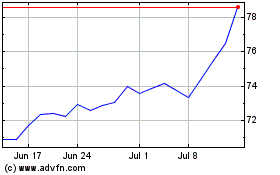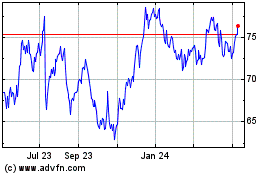Even Passive Giants Aren't Immune From Investors' Changing Tastes
July 20 2019 - 5:59AM
Dow Jones News
By Justin Baer
The surging popularity of low-cost investment funds has dialed
up the pressure on most asset managers -- including some of the
firms most responsible for the industry's transformation.
Investing giants State Street Corp. and BlackRock Inc. on Friday
reported lower earnings in the second quarter, a period in which
the Dow Jones Industrial Average ascended to a new record high and
both firms posted inflows.
A rallying stock market is usually a boon for the profits of
investment firms, which collect fees on the assets they manage for
clients. When asset prices rise, the managers' fee revenue goes up.
But investors' money is increasingly finding its way to cheaper
mutual and exchange-traded funds -- and rotating out of higher-fee
investments.
"In some cases, you've got firms losing both assets and
revenue," Ron O'Hanley, State Street's chief executive, said in an
interview. "There's a shift from active to passive, and they're
just not participating."
"For us and BlackRock, you're seeing growth but also a movement
into lower-cost products," he added.
BlackRock and State Street are top sellers of ETFs, the product
that helped accelerate investors' shift to index-tracking
funds.
BlackRock, the world's biggest money manager, said Friday that
second-quarter investment and administrative fees fell by 1.4% from
a year earlier even as the assets the firm manages jumped by more
than $500 billion, to $6.84 trillion. State Street's
investment-management division followed suit with a revenue drop
from a year earlier. In that same period, assets under management
rose to $2.9 trillion from $2.7 trillion.
State Street's shares rose $3.79, or 6.7%, to $60.08 on Friday.
BlackRock fell $1.90, or 0.4%, to $473.24.
Friday's results may set the tone for others in an industry
still wrestling with the changes wrought by investors' embrace of
passive investing. Some of the biggest active managers, including
T. Rowe Price Group Inc., Franklin Resources Inc. and Legg Mason
Inc., are slated to report their results in the coming weeks.
"BlackRock is doing much better from an earnings standpoint than
other asset managers," Morgan Stanley analyst Michael Cyprys said.
"Peers are going to be down significantly more."
The results at State Street's core asset-servicing businesses,
which perform key back-office functions to some 90% of the biggest
investment firms, underlined the tough terrain facing asset
managers.
Servicing fees fell 9.3% to $1.25 billion from a year earlier,
the custody bank said Friday.
"Nobody feels good about this industry -- at all," said Brennan
Hawken, an analyst with UBS AG. "That's not new. But it has really
come home to roost in the past three to four years."
On a conference call with analysts, State Street Chief Financial
Officer Eric Aboaf said custody banks have historically lowered
their fees on bookkeeping and other services by 1.5% to 2% a year.
But as many asset-management clients struggled to lower fees, they
pushed their custodians to cut theirs, too. Last year, servicing
fees fell on average by 4% and appear headed for a similar drop in
2019, Mr. Aboaf said.
"This industry is under pressure," said Mr. O'Hanley. "But the
reality is that even taking their custody fees to zero is not going
to solve those pressures. What this industry needs is a fundamental
restructuring of its operating model."
State Street announced plans in January to slash $350 million in
annual expenses this year as it trims jobs and automates tasks once
directed by human hands. On Friday, the custody bank upped its 2019
savings target to $400 million.
State Street's willingness to detail its cost-cutting plan may
signal it has a better handle on how low servicing fees may go
before they stabilize, Mr. Hawken said. "It's a sign they are
getting their hands around the pricing pressure," he said.
Indeed, Mr. Aboaf said Friday that declines in servicing fees
have moderated as the year progressed.
Dawn Lim contributed to this article.
Write to Justin Baer at justin.baer@wsj.com
(END) Dow Jones Newswires
July 20, 2019 05:44 ET (09:44 GMT)
Copyright (c) 2019 Dow Jones & Company, Inc.
State Street (NYSE:STT)
Historical Stock Chart
From Mar 2024 to Apr 2024

State Street (NYSE:STT)
Historical Stock Chart
From Apr 2023 to Apr 2024
